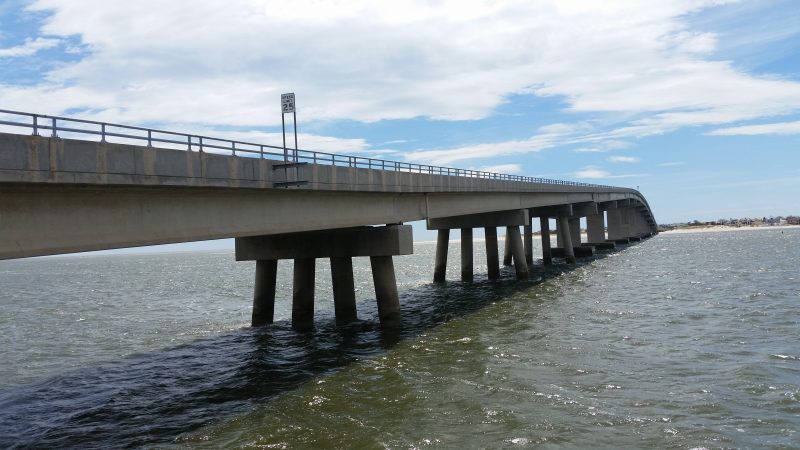By DONALD WITTKOWSKI
Motorists who usually pay their tolls in cash have been getting a break lately while crossing over the five Ocean Drive bridges that link the Cape May County beach communities.
The Cape May County Bridge Commission, the agency that operates the spans, stopped collecting cash tolls on March 26 in response to the coronavirus pandemic.
But that doesn’t mean the bridge commission won’t be seeking payment. Bills for unpaid tolls will be mailed out to motorists starting in the next couple of weeks, the commission said Thursday during its monthly board meeting.
Karen Coughlin, the bridge commission’s executive director, described the billing statements as “very friendly, nice invoices.”
The toll is $1.50 to cross each of the commission’s bridges, the Ocean City-Longport Bridge, Corson’s Inlet Bridge, the Townsends Inlet Bridge, the Grassy Sound Bridge and the Middle Thorofare Bridge. The bridges connect the Cape May County beach towns from Ocean City to Cape May along the scenic Ocean Drive.
Cash payments have been suspended indefinitely as a precaution against COVID-19. The move eliminated the person-to-person contact between motorists and toll collectors and conforms with social distancing guidelines to help slow the spread of the virus.
However, motorists who have E-ZPass continue to be charged the $1.50 toll to cross the bridges. Equipment at the toll plaza reads the E-ZPass tags and the fare will be electronically deducted from customers’ accounts, as usual.
For motorists who don’t have E-ZPass, a photo will be taken of their license plate and a bill for the toll will be mailed to the registered owner. The bill will be for the regular cash toll rate. No additional administrative fees will be charged if the bill is paid within 30 days, Coughlin said.
Cash customers who do not want to be billed can open an E-ZPass account by calling the New Jersey E-ZPass Customer Service Center at 888-AUTO-TOLL (888-288-6865) or by visiting www.ezpassnj.com.

The Ocean City-Longport Bridge is one of five toll spans that link the Cape May County beach towns along the Ocean Drive.
Coughlin noted that no thought has been given to resuming the cash tolls yet while the coronavirus crisis continues. In the meantime, the cashless toll system has been “going well,” she said.
Most of the bridge commission’s toll collectors work as part-time, on-call employees. They haven’t been laid off, but aren’t getting any hours while the cash tolls have been suspended, Coughlin said.
Overall, cash-paying drivers represent only about 20 percent of the bridge commission’s traffic. There has been no strain on the agency’s finances while waiting for cash customers to mail in their payments, Coughlin said.
In March, toll revenue for the five bridges totaled $100,481, up $5,555 compared to March 2019. Overall, toll revenue for the first three months of 2020 is $77,733 higher than the same period last year, according to the commission’s financial figures.
Helping to drive toll revenue higher this year is the Townsends Inlet Bridge, which was closed this time in 2019 for an extensive repair project. In March, the Townsends Inlet Bridge, which connects Sea Isle City with Avalon, generated $18,942 in revenue.
 The Ocean City-Longport Bridge is one of five toll spans that link the Cape May County beach towns along the Ocean Drive.
Coughlin noted that no thought has been given to resuming the cash tolls yet while the coronavirus crisis continues. In the meantime, the cashless toll system has been “going well,” she said.
Most of the bridge commission’s toll collectors work as part-time, on-call employees. They haven’t been laid off, but aren’t getting any hours while the cash tolls have been suspended, Coughlin said.
Overall, cash-paying drivers represent only about 20 percent of the bridge commission’s traffic. There has been no strain on the agency’s finances while waiting for cash customers to mail in their payments, Coughlin said.
In March, toll revenue for the five bridges totaled $100,481, up $5,555 compared to March 2019. Overall, toll revenue for the first three months of 2020 is $77,733 higher than the same period last year, according to the commission’s financial figures.
Helping to drive toll revenue higher this year is the Townsends Inlet Bridge, which was closed this time in 2019 for an extensive repair project. In March, the Townsends Inlet Bridge, which connects Sea Isle City with Avalon, generated $18,942 in revenue.
The Ocean City-Longport Bridge is one of five toll spans that link the Cape May County beach towns along the Ocean Drive.
Coughlin noted that no thought has been given to resuming the cash tolls yet while the coronavirus crisis continues. In the meantime, the cashless toll system has been “going well,” she said.
Most of the bridge commission’s toll collectors work as part-time, on-call employees. They haven’t been laid off, but aren’t getting any hours while the cash tolls have been suspended, Coughlin said.
Overall, cash-paying drivers represent only about 20 percent of the bridge commission’s traffic. There has been no strain on the agency’s finances while waiting for cash customers to mail in their payments, Coughlin said.
In March, toll revenue for the five bridges totaled $100,481, up $5,555 compared to March 2019. Overall, toll revenue for the first three months of 2020 is $77,733 higher than the same period last year, according to the commission’s financial figures.
Helping to drive toll revenue higher this year is the Townsends Inlet Bridge, which was closed this time in 2019 for an extensive repair project. In March, the Townsends Inlet Bridge, which connects Sea Isle City with Avalon, generated $18,942 in revenue.